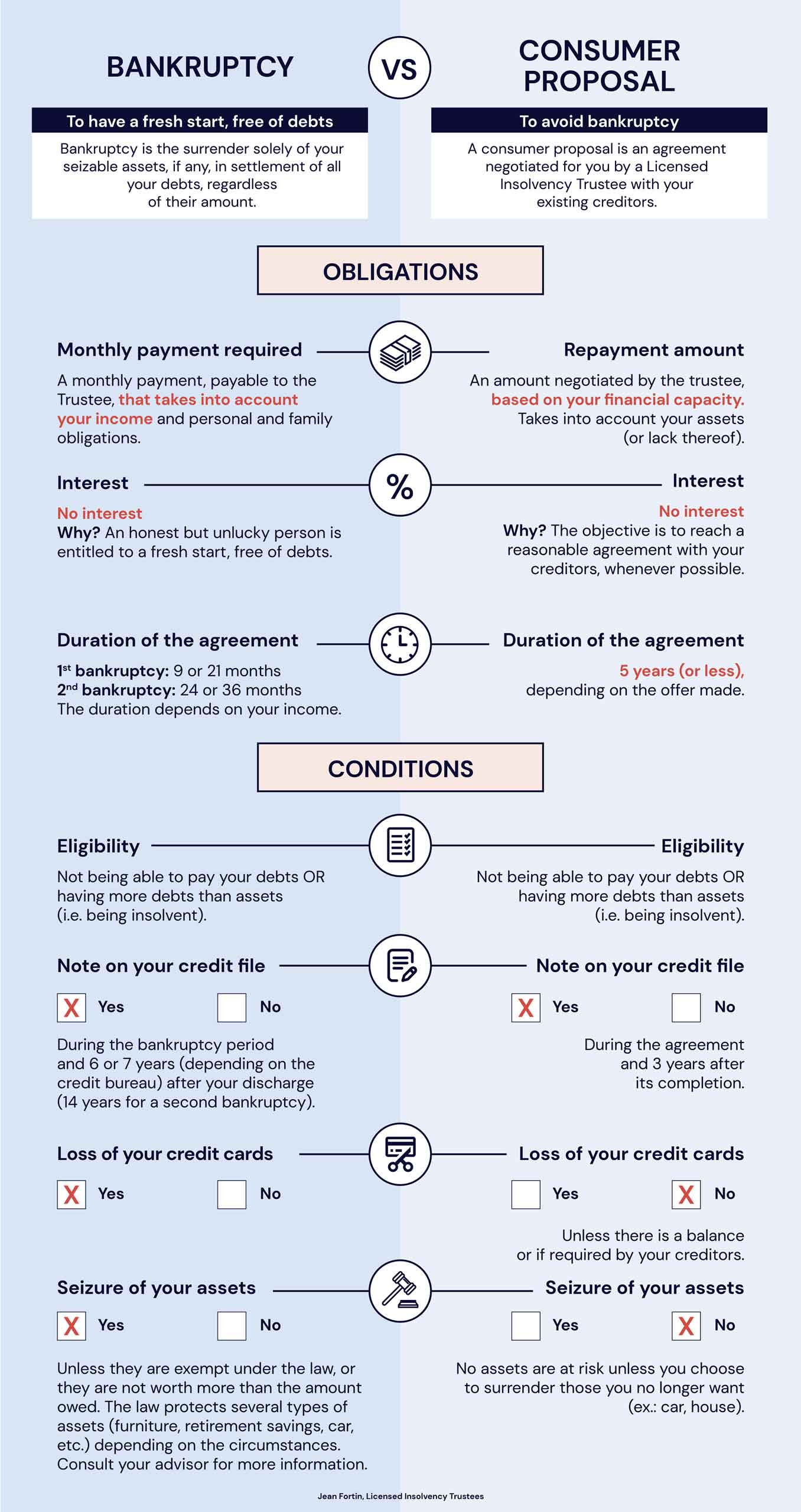What are the differences between consumer proposal and bankruptcy?
What are the differences between a consumer proposal and bankruptcy? If you’re hesitating between these 2 options and wondering what the differences between bankruptcy and a consumer proposal are, you will want to read this. The 2 main differences between a consumer proposal and bankruptcy are that the 1st option allows you to keep all your assets, without exception, and avoid the more significant consequences of bankruptcy on your credit report. When circumstances permit, the proposal should always be the 1st option to consider. Here is a summary of the differences between these 2 debt solutions:

What is personal bankruptcy?
Bankruptcy is a right granted to you by the Bankruptcy and Insolvency Act. If you are eligible, having $1000 or more of debts and cannot pay your debts as they become due, you can file for bankruptcy without the approval of your creditors.
If your income is modest, you can reach an agreement with your Licensed insolvency trustee to for a suitable monthly payment during the duration of your bankruptcy.
If your income is higher than the government’s guidelines for surplus income, the law sets the amount you will have to pay. Furthermore, depending on the circumstances, you may or may not be able to keep all the assets you wish to keep and surrender those you no longer want. During your first consultation with the trustee, he or she will be able to confirm these details and you will be able to make an informed decision.
The duration of bankruptcy is generally shorter than a proposal (first-time bankruptcy: 9 or 21 months; second-time bankruptcy: 24 or 36 months). Bankruptcy is mentioned on your credit record for 6 years (Equifax) and 7 years (TransUnion) after its completion which occurs as soon as you obtain the discharge of your debts.
What is a consumer proposal?
On the other hand, a proposal is an agreement that your trustee will negotiate on your behalf to repay your unsecured debts (e.g., credit cards, lines of credit, personal loans, etc.). The amount of your offer will not necessarily correspond to 100% of the amount owed but rather takes into account the value of your assets and a monthly payment you will be able to afford. Interest rates are automatically eliminated and, in the majority of cases, a significant reduction in the amount of debts owed is obtained.
The proposal:
- Eliminates all interest payable on debts included in the proposal.
- Ensures that you can retain all the assets you wish to keep and surrender those you no longer want.
Once the proposal is completed, your unsecured debts are discharged. The proposal lasts from 0 to 5 years (you choose the duration based on the amount offered and your financial capacity) and is recorded on your credit record for 3 years after the completion of the proposal or 6 years after it was filed, whichever comes first. Therefore, if it takes you 5 years to pay off your proposal, it will be removed the following year.
If your financial situation allows for it, a consumer proposal should always be favored over bankruptcy.
Consumer proposal or bankruptcy: how to choose?
Each situation is unique. A meeting with an advisor will allow you to explore all available solutions. Once you have had the chance to ask your questions and learn more about the advantages and disadvantages of each option, you will be able to make an informed decision. We are here primarily to inform you and, subsequently, to help you make the best decision.
By Pierre Fortin
Jean Fortin & Associés
Personal Finance Advisor
Licensed Insolvency Trustee
See also...
Consumer Proposal
Discover how to offer your creditors a lower settlement based on your ability to repay.
Financial Health Checkup
The perfect tool to get a quick picture of your financial situation.
What is the difference between debt consolidation and consumer proposal?
If you're having trouble making ends meet, you have two options to regain control of your finances and avoid bankruptcy.
